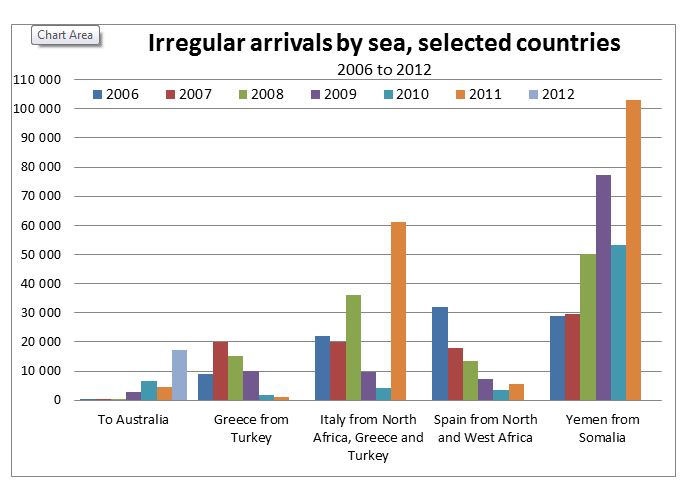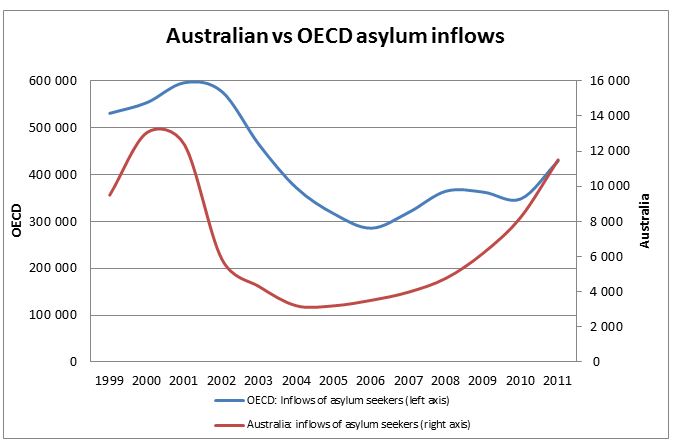With the dust settling a little I thought it might be safe to return to this issue!
I said in my blog of July 20 that I supported the general thrust of the RSA with PNG, although a lot remained to be sorted out and the implementation is already showing signs of problems. Without repeating myself too much, however, I emphasise the following.
- We cannot ignore that close to 1,000 souls have been drowned at sea trying to get by boat to Australia. Surely the critics cannot ignore this.
- Regional arrangements are the only way to go. It involves burden-sharing and cooperation, particularly now with PNG. We can’t fix the problem on our own as we found during the Indochina outflow of the late 1970s and early 1980s.
- Active involvement by UNHCR in this arrangement is most important. Both Australia and PNG are signatories to the Refugee Convention with PNG recently withdrawing its reservation. The UNHCR is considering the arrangement.
- Children cannot be exempted from the arrangement or the boats will fill up with children. Other arrangements are necessary to protect children.
- For several years I have highlighted that asylum seekers arriving by air have exceeded boat arrivals by a significant margin and the politicians and the media ignored that fact. But now the facts have changed. Boat arrivals in the first six months of 2013 were about 14,000, a trebling compared with the 4,500 who arrived in the first six months of last year.If boat arrivals continued at this rate the whole refugee/humanitarian program in 2013 of 20,000 persons would have been taken over entirely by boat arrivals.That was clearly unacceptable. As John Maynard Keynes said, ‘when the facts change, I change my view’. The facts have changed in respect of boat arrivals.
- The public hostility to boat arrivals, although quite irrational at times in my view, was threatening to prejudice the whole humanitarian and refugee program of our country. This program must be protected and expanded.
- There is no ‘orderly queue’ for refugees but the fact is that with the trebling of asylum seekers arriving by boat in recent months it has a serious impact on those waiting in refugee camps in the region, Africa and the Middle East.
- There has been some diversionary media coverage about the cost of the RSA with PNG. But the costs of existing arrangements are extremely high and look like increasing. The cost of offshore asylum seeker management by Department of Immigration and Citizenship is expected to be $2.9 billion this year; up $700 million on last year. The government has also allocated $1.4 billion to the Australian Customs and Border Protection Service. More money is spent by the Navy and some other agencies. By contrast, the foreign aid program to PNG will cost $517 million this year. If as the government hopes, boat arrivals slow there could be considerable savings. The government could also save money by abolishing mandatory detention.
A lot remains to be done and implementation will be difficult as we are seeing already.
- In the forthcoming regional conference of ministers that PM Rudd and President Yudhoyono agreed to, it must give emphasis to ‘upstream’ processing in Malaysia and Indonesia. This must be done in cooperation with UNHCR. Countries such as Australia must agree that they will cooperate on increased re-settlement places if regional countries are prepared to hold and process asylum seekers in their country.
- We must redouble efforts to negotiate orderly departure arrangements with Afghanistan, Pakistan and Sri Lanka. This is essential to provide a safe and orderly way for persons facing discrimination in those countries to come to Australia without being forced to take dangerous and irregular journeys. Many of the people in these three countries who are anxious to leave have relatives in Australia. In 1983 Australia established an ODA with Vietnam which enabled 100,000 Vietnamese to come to Australia in a safe and orderly way without risking their lives at sea.
- We badly need better cooperation between the NGOs who are naturally concerned about the plight of asylum seekers and with the policy-makers, particularly in DIAC. That is why Arja Keski-Nummi and I proposed a ‘second-track dialogue’ – see blog of July 9. Many of these NGOs need to be more constructive. It is not particularly helpful when they find themselves frequently on the same side of the political debate as Tony Abbott, Scott Morrison, Paul Sheehan and the Daily Telegraph. We live in a difficult political environment. There is no way of avoiding it.


